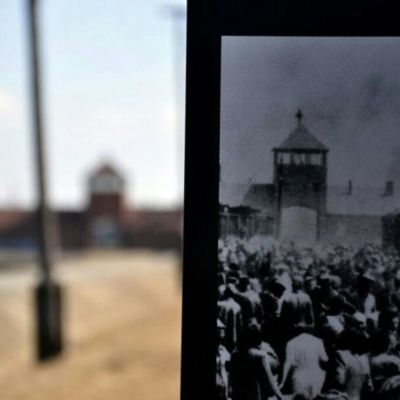The official podcast of the Auschwitz Memorial. The history of Auschwitz is exceptionally complex. It combined two functions: a concentration camp and an extermination center. Nazi Germany persecuted various groups of people there, and the camp complex continually expanded and transformed itself. In the podcast "On Auschwitz," we discuss the details of the history of the camp as well as our contemporary memory of this important and special place. We kindly ask you to support our mission and share our podcast in social media. Online lessons: http://lesson.auschwitz.org
http://www.auschwitz.org
Gesamtlänge aller Episoden: 1 day 56 minutes
episode 21: The interview with Dr. Piotr Cywiński about his book "Auschwitz. A Monograph on the Human".
“Auschwitz. A Monograph on the Human” is a new book by the Auschwitz Museum Director Dr. Piotr Cywiński. It is the first attempt - on a global scale - to delve so deeply into human emotions inside the camp. It is a must-read for those seeking to understand what Auschwitz was all about.
The gathering of materials and work on the publication took almost six years...
episode 21: "On Auschwitz" (21): The Revolt of Sonderkommando Prisoners
On October 7, 1944 a revolt took place at the Auschwitz II-Birkenau camp, in the Sonderkommando - the special work unit that consisted mainly of Jewish prisoners whom the Germans forced to work in gas chambers, burning pits areas and crematoria. Dr. Igor Bartosik of the Auschwitz Memorial Research Center talks about the background of resistance of the Sonderkommando and the revolt itself...
episode 22: "On Auschwitz" (22): The Archives of the Auschwitz Memorial
The Archives of the Auschwitz Memorial collect, preserve, and provide access to documents and materials connected mainly with the history of the Auschwitz camp.
The collection includes original German camp records, copies of documents obtained from other institutions in Poland and abroad, source material of postwar provenance (memoirs, accounts by survivors, material from the trials of Nazi war criminals, etc...
episode 22: "On Auschwitz" (23): the sacrifice and death of father Maximilian Kolbe
At the end of July 1941 the camp commander Karl Fritzch selected 10 hostages from among the prisoners in Block 14 in retaliation for the escape of a prisoner. He condemned them to death by starvation in the bunker of Block 11.
During the selection, a Polish prisoner who was a Franciscan monk and missionary, Maksymilian Kolbe (no. 16670), stepped out of link and asked the camp commander to take him instead of a desperate selected prisoner Franciszek Gajowniczek (np. 5659)...
episode 24: "On Auschwitz" (24): New Research on the History of Auschwitz
It might seem that we already know everything about the history of places such as Auschwitz, because several decades have passed since the events and we have access to a great many documents and thousands of testimonies. However, this is not true. We are constantly learning new facts about the history of the camp, as Dr. Piotr Setkiewicz, the head of the Memorial Research Centre, explains in our podcast.
episode 25: "On Auschwitz" (25): Orchestras at Auschwitz
The camp orchestra played for the first time at the German camp Auschwitz at the beginning of January 1941. Initially there were seven musicians there, but the ensemble grew very quickly. The main task was to play military marches to the rhythm of which the prisoners marched as they left for work and returned to the camp. The orchestra also gave concerts for the SS garrison members and prisoners...
episode 26: "On Auschwitz" (26): Deportations of Poles from the Zamość region to Auschwitz
After Germany attacked the Soviet Union in June 1941. Heinrich Himmler gave the order to create a "German settlement area" around the occupied Polish town of Zamość. The population of that region was to be expelled and replaced by German settlers.
The area was chosen for its agricultural character. It consisted of five towns and 696 villages.
The displaced population was sent to transit camps, where they were subjected to racial screening...
episode 27: "On Auschwitz" (27): Liquidation of the Auschwitz camp
In the second half of 1944, due to the Red Army successes and the advancing Eastern Front, the SS authorities in Auschwitz decided to evacuate some 65,000 prisoners to camps in the German Reich interior. At the same time, they began to destroy the evidence of the crimes committed in the camp. Dr. Jacek Lachendro from the Research Center of the Museum talks about the last period of the operation of Auschwitz...
episode 28: "On Auschwitz" (28): Liberation of the Auschwitz camp
On 27 January 1945, Red Army soldiers liberated over 7,000 prisoners of the Auschwitz. The 1,689-day history of this concentration and extermination camp came to an end. Dr Jacek Lachendro of the Museum Research Centre tells us what the last days of Auschwitz looked like and what happened immediately after the liberation.
See also our online lesson about evacuation, liquidation and liberation of Auschwitz: http://lekcja.auschwitz.org/en_11_wyzwolenie/
episode 29: "On Auschwitz" (29): British prisoners of war near the Auschwitz camp
One of the groups of witnesses to the crimes perpetrated at the concentration and extermination camp Auschwitz were British prisoners of war who were forced to work on the construction of the IG Farbenindustrie factory. The building site was located in the immediate vicinity of the Auschwitz III-Monowitz camp and a few kilometers from the Auschwitz I main camp. British prisoners of war were also employed at the mines in Libiąż and Jaworzno, where Auschwitz sub-camps were later established...
